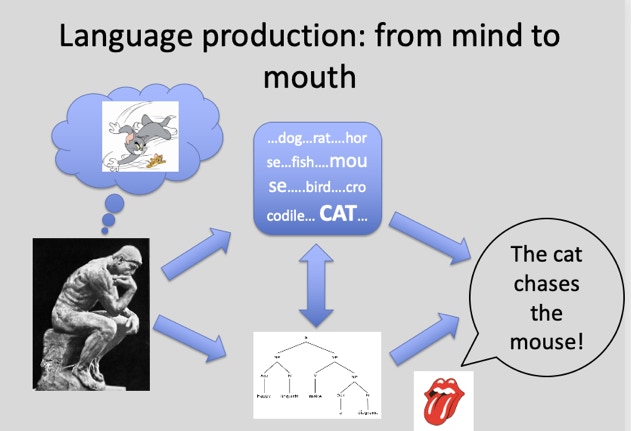Rob Hartsuiker’s research
Find my publications, reviewer record, data, materials, and preprints:




This page lists a selection of research projects from my lab. Additionally, I have an active collaboration with Prof. Sarah Bernolet (University of Antwerpen). Together we supervise two PhD students at UA. I am co-PI in the large research project “Language Productivity at Work” at the department of linguistics of Ghent University. I am soon recruiting a PhD student and a postdoc on that project! My research is funded by FWO, Ghent University Special Research Fund, the European Commission, and the China Scholarship Council.
Slide from one of my lectures, sketching the language production system in very broad strokes. A thinker represents a message in their mind (not necessary in visual form!). The speaker then needs to find words, build a sentence structure and integrate the two. This is followed by encoding the sounds and articulation.


Several of my projects involve the study of multilingual language processing. One overarching question is whether multilinguals share representations of their languages when these overlap or whether they keep their languages separate. Research projects here include:
- ◦ The lemma project (recently completed) which studies the interface between language and memory in the context of higher education. With Marc Brysbaert, Wouter Duyck, and Martin Valcke as co-PI.
- ◦ Social Accent (recently completed). This ERP project asked whether listening to a person with a non-native accent affects how you respond to statements they make - and why. Main collaborator: Alice Foucart
- ◦ Development of syntactic representations in second language learning. In this FWO-funded project, we tested a model of syntactic acquisition in late second language learning proposed by Sarah Bernolet and myself. Merel Muylle worked on this project for her PhD.
- ◦ Cross-linguistic priming in the comprehension of logical form. Mieke Slim works on this project, which asks whether semantic representations of quantification (all boys eat a pizza) are shared between one’s different languages.
For many years, I’ve been interested in the question of how speakers monitor their own speech (“verbal self-monitoring”). When you speak, you can usually hear your own voice, but what other channels do you have for inspecting your own speech? How do you combine the different channels? Current projects include:
- • Sense of agency in speech production. This project, funded by Ghent University’s special research fund, ask how people adapt their speech to auditory perturbations and whether this depends on how strongly speakers feel “in control” over their own speech. With Andreas Lind and Matthias Franken.
- • DEMOS means Disfluencies and eye-movements during language production. It uses eye-tracking to follow visual attention during the description of a network of objects, and tries to relate disfluencies and eye-movement patterns to trouble during specific stages of production and self-monitoring.


How do we go from thinking to articulation in language production? How do different processing stages interact in order to produce a sentence structure in production or predict and parse one in comprehension? Projects here include:
- • Chi Zhang works on the interaction of syntactic and other (lexical, semantic, phonological) information during sentence production.
- • Xuemei Chen does eye-tracking research on effects of verb bias on sentence comprehension in mono- and multilinguals.